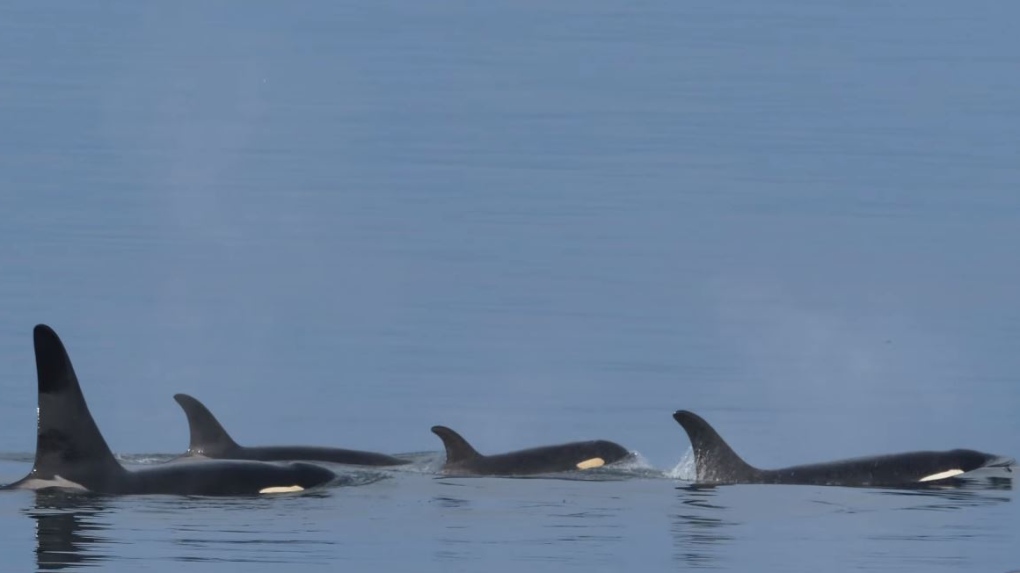Toilet paper toxin found in endangered killer whales, say B.C. researchers
 Researchers with the Washington state-based Orca Behavior Institute and the Center for Whale Research both reported sightings of the new calf Thursday. (Orca Behavior Institute)
Researchers with the Washington state-based Orca Behavior Institute and the Center for Whale Research both reported sightings of the new calf Thursday. (Orca Behavior Institute)
Toxic chemicals from toilet paper have been found in the bodies of British Columbia's endangered orcas, according to a study conducted by marine scientists.
Researchers at the University of British Columbia analyzed tissue samples from six southern resident killer whales and six Bigg's whales, also known as transient killer whales, stranded along the coast of B.C. between 2006 and 2018.
Dr. Juan Jose Alava, co-author of the study, said in an interview Thursday that the findings left him and other researchers “shocked and saddened.”
He said the toxic chemical substances could affect killer whales' hormone systems, disrupting physiological function and making them susceptible to diseases.
The findings were published last month in the journal Environmental Science and Technology.
A news release from UBC said one of the most common pollutants found in the killer whales' bodies was 4-nonylphenol, which is often found in toilet paper and can influence the nervous system.
In addition to toilet paper pulp, it is also used in soap, detergents and textile processing, and is listed as a toxic substance in Canada.
It was the most common single pollutant found in the whales, making up 46 per cent of the total identified chemicals.
Another group of toxic pollutants of great concern is known as “forever chemicals” since they can last for a long time in the environment, said Alava, who is also the principal investigator of the ocean pollution research unit at UBC.
These made up just over half of the contaminants found in the whales, the university said.
“Forever chemicals are the groups of contaminants that can cause immunotoxicity, making marine mammals like killer whales more susceptible to pathologies and emerging infectious diseases,” said Alava.
The chemicals are used in food-packaging materials, stains, cookware and fire extinguishers.
One such compound, known as 7:3 FTCA, had not been found in B.C. before, but was the most common of the forever pollutants found in the whales' bodies, Alava said in the UBC statement.
The various toxins leaked into the ocean via sewage treatment plants and industrial runoff before entering the food chain, Alava said.
He said in the interview it was time to call for more “strict regulations and prevention actions” to limit the containment emissions into the oceans, especially since southern resident killer whales are endangered.
“It raised a red flag that we need to continue to monitor and enforce more regulatory efforts to conserve and keep the survival of our southern resident killer whales,” said Alava.
He said tissue samples from one pair of southern resident killer whales showed researchers that the pollutants could be transferred from mother whales to their calves, perhaps explaining a low survival rate of killer whales' first-born calves, said Alava.
“Their mother was being exposed to all these toxic plastic mixtures all the time.”
Chemical pollution wasn't just of concern because of its impact on marine life, said Alava.
“We are also mammals, breathe the air and eat the salmon as well. Prevention is better than cure; we need to look for a precautionary approach to avoid the emission of chemicals into the environment,” said Alava.
This report by The Canadian Press was first published Jan. 12, 2023.
This story was produced with the financial assistance of the Meta and Canadian Press News Fellowship.
CTVNews.ca Top Stories

opinion Tom Mulcair: Prime Minister Justin Trudeau's train wreck of a final act
In his latest column for CTVNews.ca, former NDP leader and political analyst Tom Mulcair puts a spotlight on the 'spectacular failure' of Prime Minister Justin Trudeau's final act on the political stage.
B.C. mayor gets calls from across Canada about 'crazy' plan to recruit doctors
A British Columbia community's "out-of-the-box" plan to ease its family doctor shortage by hiring physicians as city employees is sparking interest from across Canada, says Colwood Mayor Doug Kobayashi.
'There’s no support': Domestic abuse survivor shares difficulties leaving her relationship
An Edmonton woman who tried to flee an abusive relationship ended up back where she started in part due to a lack of shelter space.
opinion King Charles' Christmas: Who's in and who's out this year?
Christmas 2024 is set to be a Christmas like no other for the Royal Family, says royal commentator Afua Hagan. King Charles III has initiated the most important and significant transformation of royal Christmas celebrations in decades.
Baseball Hall of Famer Rickey Henderson dead at 65, reports say
Rickey Henderson, a Baseball Hall of Famer and Major League Baseball’s all-time stolen bases leader, is dead at 65, according to multiple reports.
Arizona third-grader saves choking friend
An Arizona third-grader is being recognized by his local fire department after saving a friend from choking.
Germans mourn the 5 killed and 200 injured in the apparent attack on a Christmas market
Germans on Saturday mourned the victims of an apparent attack in which authorities say a doctor drove into a busy outdoor Christmas market, killing five people, injuring 200 others and shaking the public’s sense of security at what would otherwise be a time of joy.
Blake Lively accuses 'It Ends With Us' director Justin Baldoni of harassment and smear campaign
Blake Lively has accused her 'It Ends With Us' director and co-star Justin Baldoni of sexual harassment on the set of the movie and a subsequent effort to “destroy' her reputation in a legal complaint.
Oysters distributed in B.C., Alberta, Ontario recalled for norovirus contamination
The Canadian Food Inspection Agency has issued a recall due to possible norovirus contamination of certain oysters distributed in British Columbia, Alberta and Ontario.

































